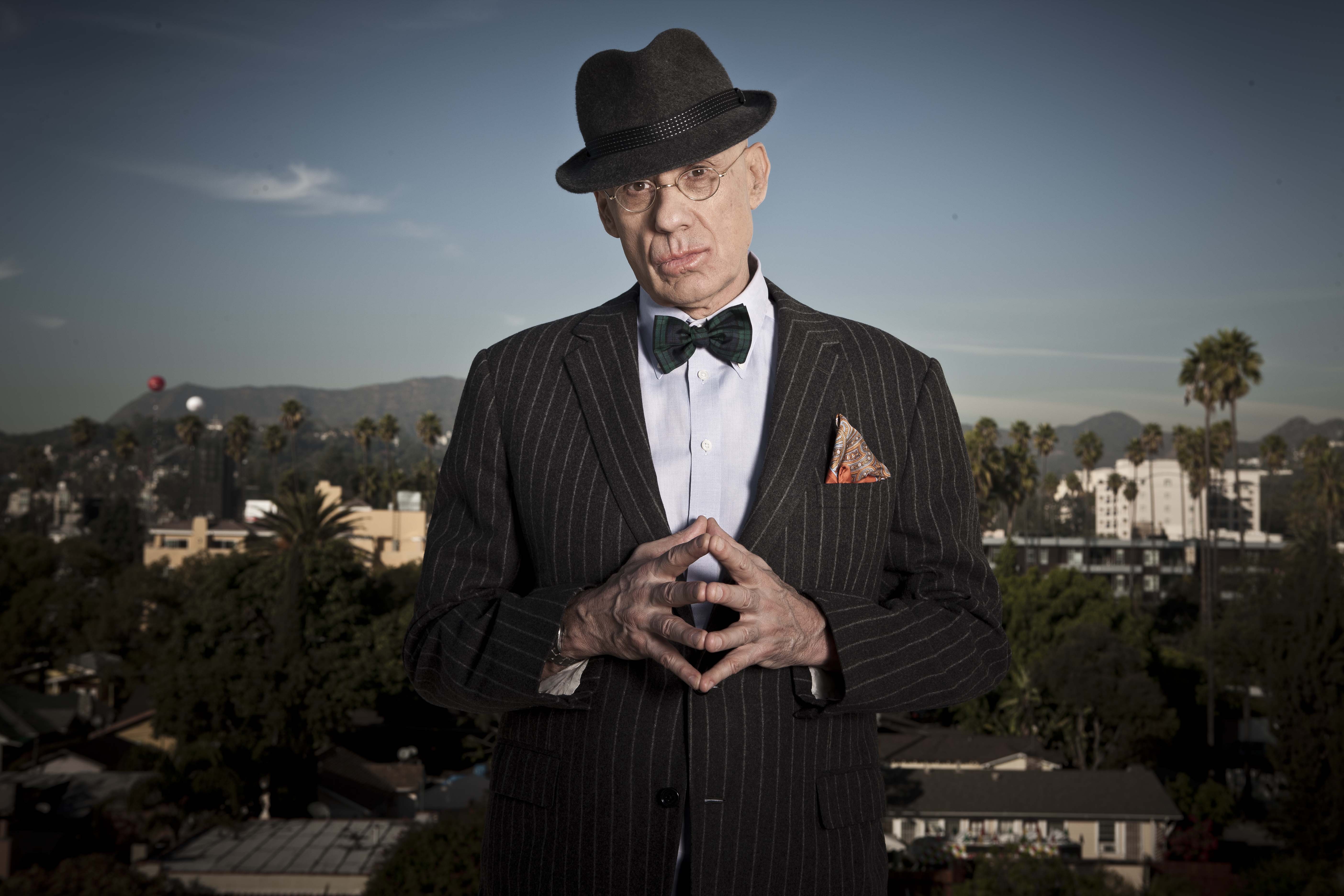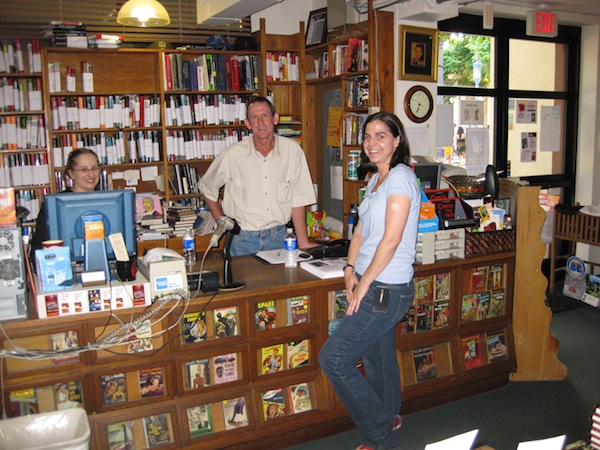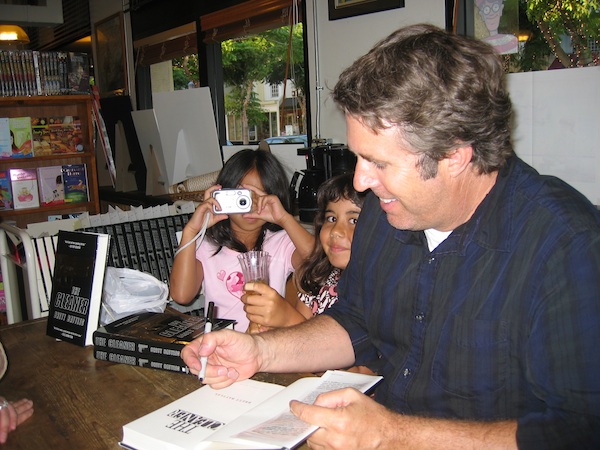By Cornelia Read
Many years ago, my sister Freya and I went up to Grandmama Read’s house in Purchase, New York, to hang out with our dad for a couple of days. He’d driven east from Malibu in his old VW camper, and was spending some time at the old family place.
I wrote about that house in my first novel, A Field of Darkness, but moved it to Centre Island, New York (across the Long Island Sound) and gave it to my protagonist Madeline’s great-grandmother on her mother’s side.
It was probably the rotting magnificence of the place that always made me feel at one with F. Scott Fitzgerald’s advice to his daughter Scottie in a letter:
You are a poor girl… and if you can’t make up your mind to being that, you’ll become one of those terrible girls who don’t know whether they are millionairesses or paupers.
Oddly enough, he wrote that to her when she asked if she could go to Dobbs, my high school. I suppose they didn’t have scholarships in those days, which is how I afforded the place.
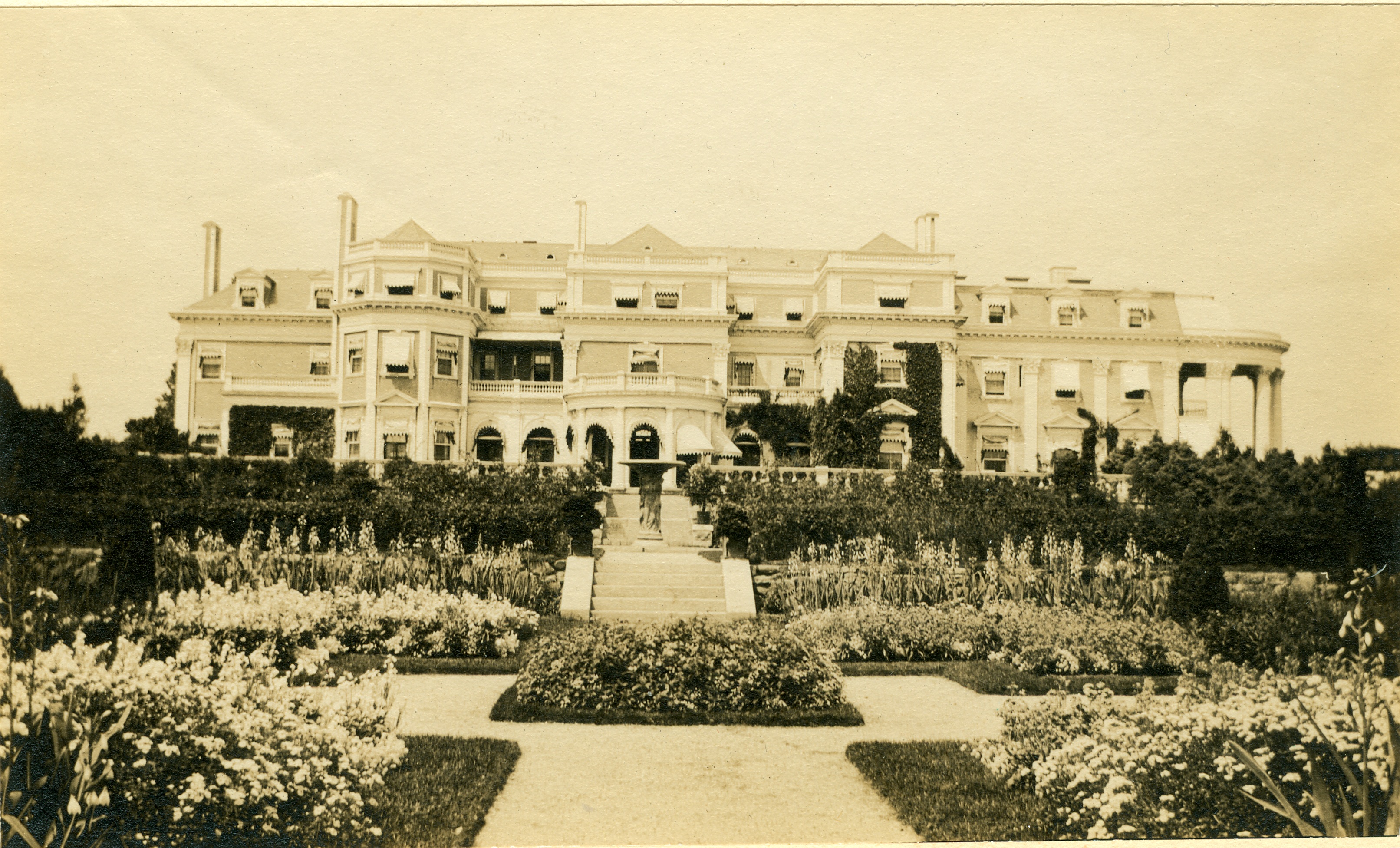
(This is actually my GREAT-Grandmother Read’s house in Purchase, now a country club.)
But here is how I described Grandmama’s house, which was called WAREF in real life–for William Augustus Read and Edith Fabyan:
The trimmed lawn was a last-minute attempt to conceal massive and catastrophic entropy, ineffectual trompe l’oeil. There wasn’t the time or inclination to pull the thick beard of ivy from the twenty visible windows, to replace the broken, coffin-shaped panes of glass in the great bronze lantern. It was just another rotting pre-FDR palace that had started as an homage to Monticello and ended as a second-act Gone With the Wind set–forty acres, no mule.
I stepped through an arched doorframe and into the cool, boxwood-scented darkness of the arcade leading to the front door. There were no sounds but the last of the Canada geese, honking as they abandoned the place, and the heels of my loafers ringing off the slate in the few spots that weren’t choked with fallen leaves.
More leaves had blown inside, skirling around the thirty-foot diameter of dark marble floor as I came through the front door. The entry was [hmmm… a typo. I meant “surrounded by” here, or something] a circular, gossamer-railed staircase sweeping up to a viewing balcony, light slanting in through high windows.
Bronzes of my great-grandparents’ heads rested in a niche halfway up the stairs. Dodie’s hair was shingled flapper-style, Jake’s brilliantined straight back off his forehead. The room would have been imposing, had the pale mint wallpaper not been hanging down in broad sheets, only occasionally stuck back up to the plaster with ragged lengths of packing tape.
Considering how badly I’d fucked things up in the last week, it seemed entirely appropriate that I was back here at Chateau Failure to mark the occasion.
Well, I’m going to keep going with this, so you have the full sense of what it was like to wander on inside…
“Hello?” I said, my voice echoing until a pair of yipping, rheumy-eyed shih tzus came barreling around the corner [their names were Pensee {pan-ZAY} and Bouton {boo-TON}] their nails clattering on stone, yellowed hair held off their faces with tiny pink and blue plastic barrettes.
I waded through the dogs and into the dining room, where the table was set for twenty. Dodie’s portrait condescended from above the sideboard, emeralds sparkling from her cocked hip.
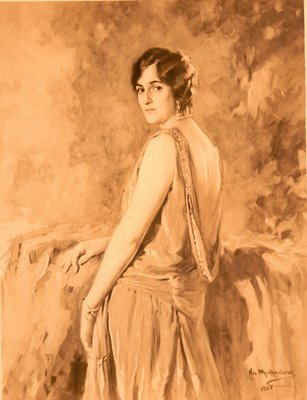
[Tougher to see in this sepia repro. That’s actually an emerald-and-diamond bar pin in the hanging sash of her dress, directly below her left wrist.]
I touched the bottom of the frame, though of the painting’s nickname and whispered “Nice to see your back again,” [the title thought up by a weekend houseguest, admiring this likeness from the dining room table sometime during the Twenties, if memory serves…] then ducked through the pantry and into the kitchen itself.
My father was the youngest of Grandmama’s nine children–Bill, Curtis, David, Roddy, Peter, Sandy, Donald, Jean, and Freddy. Still the rebel one, the little boy who’d held his breath lying on the floor of FAO Schwarz in the city until she’d bought him the firetruck he was desperate for one Christmas season, though secretly she’d recently purchased the same truck and it was already wrapped up for him at home. I suppose with your ninth child you tend to just give in.
So picture the two of them at that long, french-polished mahogany table for dinner in the early Eighties, with my sister and I along for the ride. Dad’s hair was graying, his ponytail long, his long untrimmed sideburns wild as a whaling-ship captain’s muttonchops. Grandmama was hunched forward with age–her thin silver hair up in a sparse chignon, wearing her Belgian shoes and a silk day dress under a thin cardigan.
Maria the cook, in her plaid flannel shirt and blue jeans and baseball cap and sneakers–gold front tooth winking as she grinned at me in the candlelight–would have brought out one of the two salads perpetually served at that table: either a wedge of iceberg lettuce in Thousand Island, or shredded iceberg serving as a bed for half a canned pear with a dollop of cottage cheese in the hole where the core had been, dressed with a splash of translucent, bottled, and herb-flecked “Italian.”
These first courses of lackluster greens were served in bowls and underplates of heartbreakingly exquisite porcelain, which of course only served to magnify their culinary pedestrianism. And after 1976, I always thought of my Grandfather Gus before I took a first bite of lettuce, missing the way he’d wrangle his salad around a little with a heavy silver fork before pushing the bowl away and raising his head to look down the long table, trying to palm it off on someone else as he’d done at every meal I could remember by querying in his Whartonesque New York accent [think FDR pronouncing “nothing to fear but fear itself” without a single modern “R” sound], “Who’d like some more of this delicious bunny bait?”
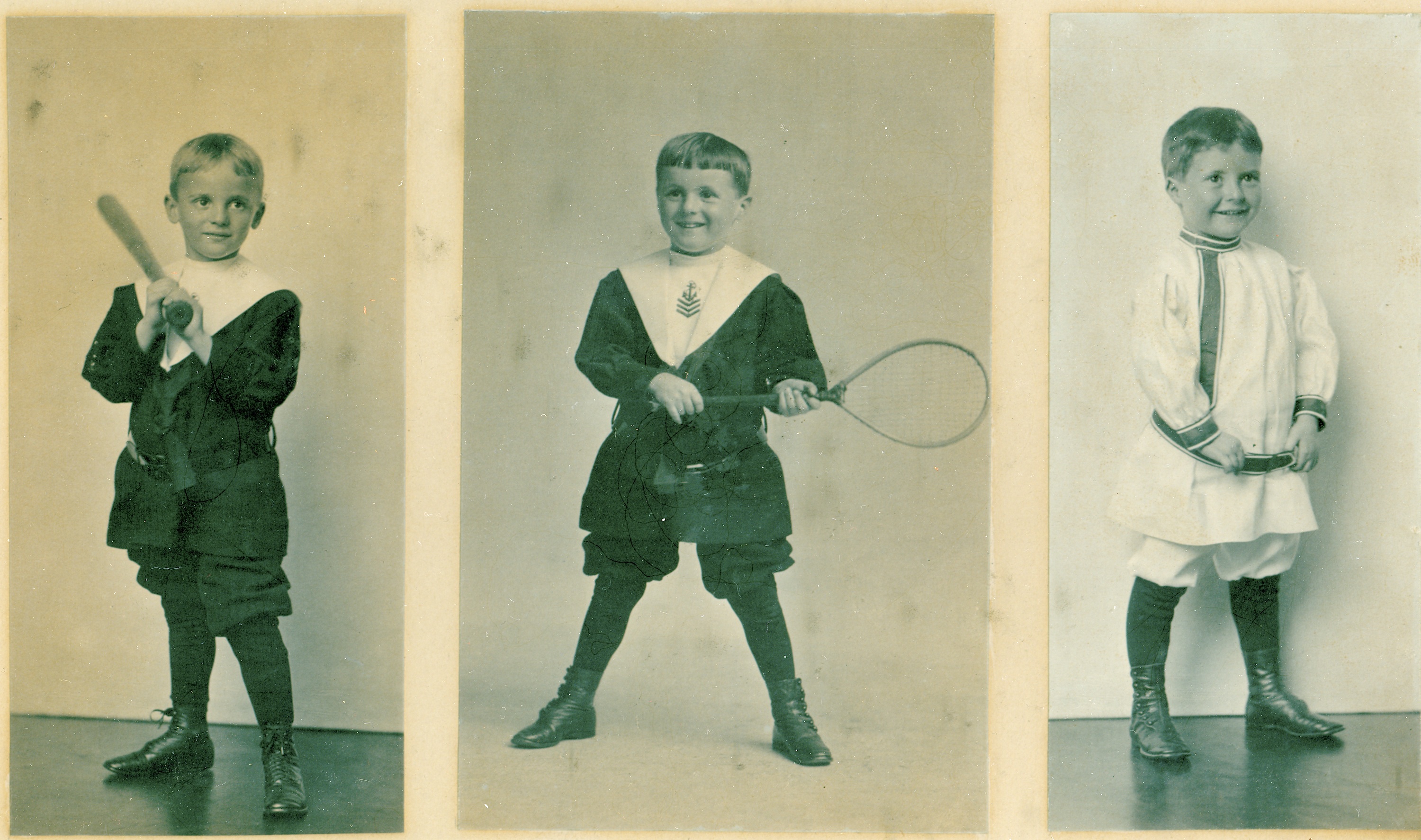
(Grandaddy on the left, as a child, probably circa 1900. The boy in the other two images is his twin brother Curtis–one of the first Americans to die in France in World War I. Grandaddy held FDR personally responsible for the loss of his brother, as Roosevelt had then been secretary of the Navy and as such had purchased a number of defective Doran airplanes from the French.
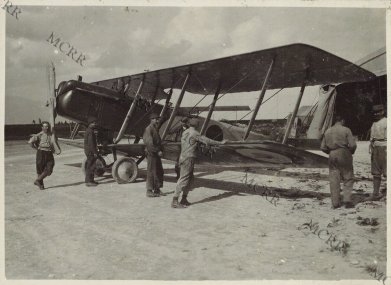
Great-Uncle Curtis was sent up in one to test it out and crashed off Dunkirk. Apparently, the fabric had a habit of peeling off the wings.)
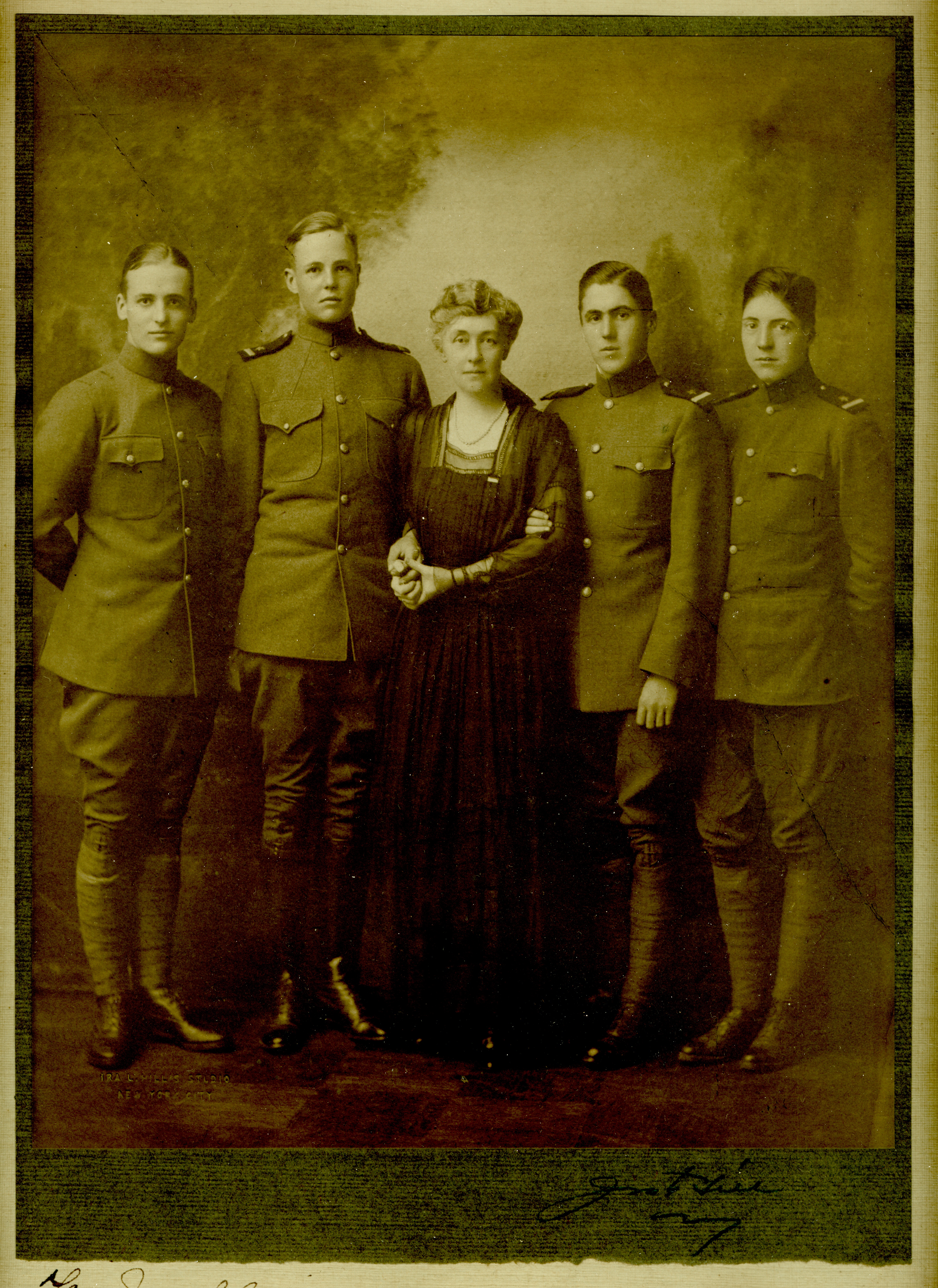
(Left to right: Grandaddy Read (William Augustus,) Russell Bartow Read, Caroline Seaman Read, Curtis Seaman Read, Duncan Hicks Read.)
But of course that night with Dad and Freya and Grandmama, Grandaddy’s chair was empty. It was just the four of us seated close to one another at the table’s other end, awkward together as Reads so often seemed to be: Grandmama in the late stages of her final dementia, Dad stoned and petulant, Freya and I holding our collective breath–the poor relations, not wanting to put a foot wrong because just about anything could set our father off into yet another one of his Primal Therapy crying and/or screaming jags (something to be avoided at all costs, especially mid-meal.)
The room was candle-lit, a good number of tapers flickering from the arms of two large Georgian candelabra. Maria disappeared back into the kitchen, its swinging door hidden from sight behind a large folding Chinese screen, graceful figures gliding timeless through black gardens.
Behind Grandmama was a large bay window, through which you could glance over the property in the daytime, the view extending past the long swimming pool and Grandaddy’s hangar and the servants’ cottages and across Westchester County in the distance, all the way to the Sound on a clear morning. The other end of the room had a large fireplace at the center of the wall, flanked by a pair of tall built-in sets of shelves that contained platters and serving pieces of Rosenthal china, glazed in white and gold and salmon with a proud stag portrayed at the center of each.
[Two years later, Freya and I and Cousin Mark and our friend Sue from boarding school would stand in a circle before that same fireplace, the room now emptied of furniture following Grandmama’s death, our arms around each other’s shoulders as we sang “Lean on Me” from start to finish–all of us crying, but secure in the knowledge that we’d be kinder and more loyal to one another than all the previous generations had managed to be. And why not? There was literally nothing left to fight over, no possessions or fortune to drive us apart.]
We ate in silence, Grandmama’s new teeth unmoored in her mouth.
Freya and I, having had the importance of dinner-table conversation drilled into us by our mother over many long years, were wracking our brains for some inoffensive topic to offer up. She thought of something first, thank God.
“I was at a county fair recently,” she said, tossing a bouquet into the conversational abyss. “And I had my fortune told by an old gypsy. She told me I’ll have two children someday, a boy and a girl.”
Grandmama brightened. “You have a son and a daughter?”
“Not yet,” said Freya. “But a fortuneteller told me I will someday.”
“How lovely,” said Grandmama. “I’m sure you’ll be a very fine mother.”
We knew Grandmama was fond of fortunetellers. Her girlhood best friend from Boston, Mrs. Vanderhoff, had also moved to Purchase, and used to tell fortunes with regular playing cards. She’d taught Mom this method of divination in the early Sixties, and we’d clamored for readings as children.
Every card had some lovely meaning: “In the woods near the water,” “a dark-haired older man….” Even the things one was meant to say while laying out the patterns of each phase of the reading were wonderful, “To your house, to yourself, to your wish/What you do expect, don’t expect, sure to come true…”
Maria came out to clear the salad plates away, then brought forth some overcooked lamb chops and frozen string beans. The table went silent once again, but a few moments later Dad brought forth a trial topic.
“I was driving across the country in the van,” he began. “Things went rather well until the center of Kansas, when all of a sudden BOOM, CRASH, TINKLE-TINKLE, the whole engine gave up…”
Grandmama looked up again from her plate, saying (and this you should hear with your mind’s ear as a feminine version of Charles’s Boston Brahmin accent, on MASH) “What’s that, Freddy–fortunetelling in a thunderstorm?” (fawtune-telling in a thundah stawm?)
Which was hysterically funny, to all of our great relief, and the four of us shared a deeply good communal laugh–the likes of which that table had probably not been the site of since the mid-Sixties.
Grandmama was so pleased to have scored our approval, though she was uncertain of the conversation’s general thrust, and of which year in which it happened to be taking place. But that was the happiest I’d seen her in as long as I could remember, and it was a wonderful night because of that.
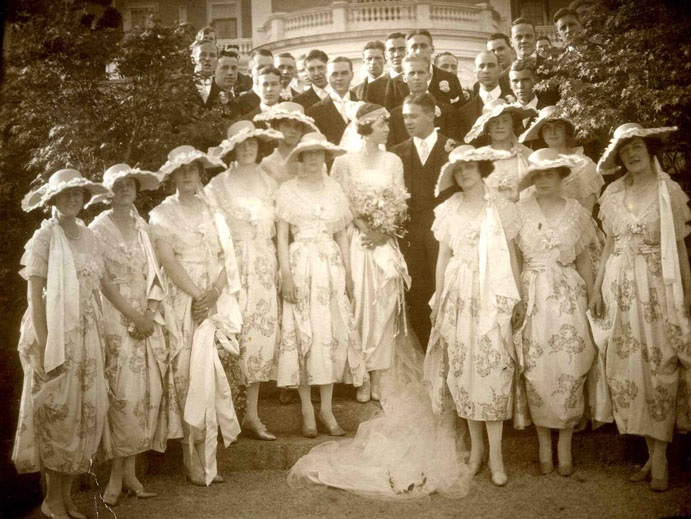
(Grandmama is third from left, front row. This was taken at Great-Grandmother Read’s house in Purchase. The bride is Carol Read, Grandaddy’s sister. She’s marrying Archilbald McIlwaine, another WWI Naval Aviator who was part of the “Millionaire’s Unit” of Yalies, along with Great-Uncle Curtis. Click here for the archived wedding announcement in the NY Times, if you’d like to know what the bride, bridesmaids, and maid of honor were wearing. Apparently there were 600 guest, many of whom “arrived by special train from New York to White Plains, motoring from there to Hill Crest.”
Most of the ushers were flyers, too. This great guy named Ron King is working on a documentary about them all, and gave me this jpeg over Christmast. Check out his website for the film: http://www.millionairesunit.org/. It’s totally gorgeous.)
Freya did indeed have two children in the years that followed, a boy and a girl. They’re terrific.
Dad and Grandmama are gone, WAREF has long since been sold, the portraits are all with Aunt Jean in Buffalo. Who knows who got the silver. We have a little bit of china.
Many years afterward, I was meant to be driving from New York to Boston but pulled off the Hutchinson Parkway onto Purchase Street, suddenly aching to see the old place though I was already running late. I drove along the long road, beneath the shade of its ancient trees, unsure of my bearings.
Finally, up on the right I saw the old pale brick wall and pulled into the driveway. There were construction vans out front. The new owners were doing all the work my family had neglected for the past forty years.
I looked up at the old bronze lantern over the entryway’s arch, at the white window sashes set into the facade’s pink Monticellan facade. I thought of getting out of Dad’s Porsche in 1965 with my teddy bear in my arms, coming to visit with Baby Freya for the very first time.
She was swaddled up in woolen blankets in the car’s back seat, tucked into a wooden bureau drawer for a bassinet. There’s a photograph that Mom took as I’m looking up at her from beside the green car, wearing a little gray wool coat and white ankle socks and brown laced Buster Brown shoes.
Dad’s behind me, leaning down to pick up Freya. His hair is crisply cut short, parted exactly, slicked back. Brooks Brothers shirt, cable-knit sweater, elegant shoes: the “Before” picture, if ever there were one.
It was probably twenty-five years later that I stood next to the carpenters’ cars and vans, listening to the sound of saws and sanders from inside, thinking about all we’d lost in the interim, but all we’d gained too. Made me cry a little.
A young dark-haired guy stepped out from the entry’s arcade and smiled at me. “Help you with anything?”
“Sorry,” I said. “I just wanted to stop and look. This was my grandparents’ house and I haven’t seen it in a long time.”
“Really?” he said, smiling wider. “We’ve all been wondering about who they were… what they did, to have lived in a place like this.”
He seemed like a really nice guy, so I said, “Well, they didn’t do a whole lot. They were both born rich, you know?”
“Where’d the money come from?”
“My great-grandfather founded a bond house in New York.
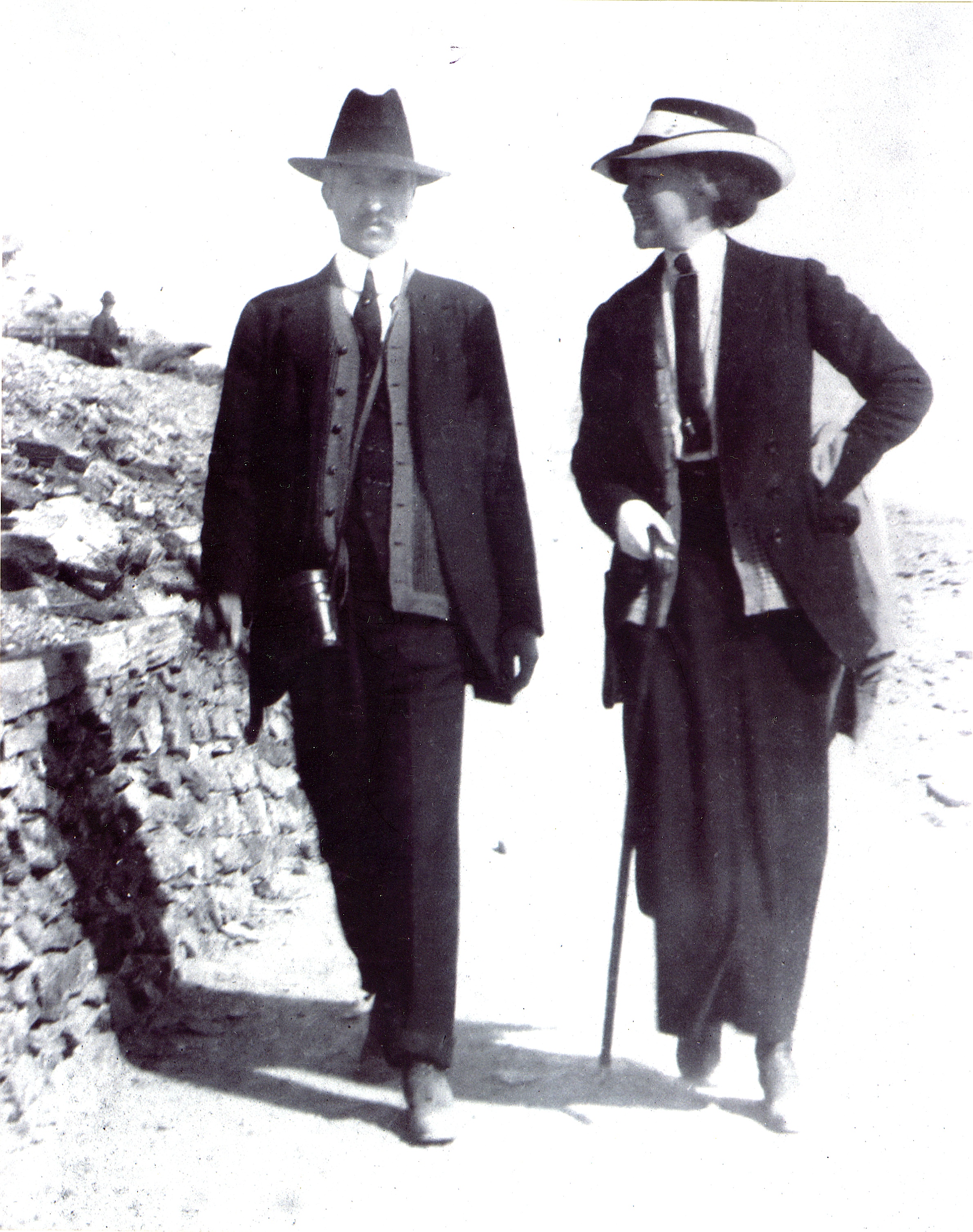
(The great-grandparents, William and Caroline. Newport?)
…His sons kind of hung out, after that. They were Naval Aviators in World War I, but I don’t know a lot other than that. I grew up in California. My dad dropped out and became a hippie and lived in his van and worked in a gas station and stuff. He didn’t really like to talk about all this.”
“No shit?”
“No shit. And it’s kind of a trip to think I hung out here, as a kid. Seems like someone else’s dream, you know?”
“I bet,” he said.
I crossed my arms and looked up at the window of the bedroom I used to stay in, the one with the green-and-white toile wallpaper with all the peacocks.
“You want to see inside?” he asked. “We’ve done a lot of work. It looks pretty good now.”
“Thank you for the invitation, but I’m running really late. Gotta get to Boston.”
“Mind if I bring some of the guys outside? They’d probably dig getting to meet someone who lived here.”
“Sure,” I said. “I’d like to meet them, too.”
So I waited for a minute while he went back in, then returned with a half dozen young men in painter’s pants and sweatshirts and toolbelts. We all shook hands, and I thanked them for taking such care with the place. They were really nice.
“Tell the new people I hope they’re really happy here,” I said. “It’s a beautiful place. It deserves to have happy people in it.”
Then I got in my car and drove to Boston.
I’ve been thinking of all that a lot over the last couple of weeks. I’ve got a bit of a lull in the writing, waiting for my editor’s notes on my first draft of Book Four, and the holidays are over, and I’m wondering what’s up with my love life, and what the new year’s going to bring, and whether the second draft of this book is going to be any good… the usual shit and worries and demons, with some nice stuff mixed in lately too.
So I’ve been doing a little fortunetelling for myself, thinking of Mom and Grandmama and Mrs. Vanderhoff while I do it. Mostly online, tarot cards and I Ching (Dad’s favored method of divination).
I think fortunetelling is kind of great, if you take it in the right spirit. A little guided meditation, some thinking points on what you’re going to do next, what random things might be coming into play, and how you can accept challenges mindfully and stay as kind and compassionate as possible in the process. So I thought I’d share a few links to good websites for anyone who’d like to gain a potential overview of the coming year–love and work and people and everything. Some are more serious than others, some really just for fun, some deep, some glancing over the surface of things. I like them all…
Salem Tarot
You can get a pretty decent free three-card reading at this site. My pal Muffy turned me on to it years ago. I like it so much I actually got a live reading from Christian Day in Salem, right when my first book was coming out. Nice guy–he told me he saw me sitting at different tables, always surrounded by piles of books. He said my life was going to get immeasurably better. He was right.
Click here for a free three-card spread.
Hollywood Tarot
This one is just fun. The webmaven designed a deck using publicity shots (well, and mug shots) of the famous: the Nine of Cups is Barney, the Princess of Wands is Madonna. Frances Farmer is in there, and Grace Kelly, and Dolly Parton. Not deep, but often apropos…
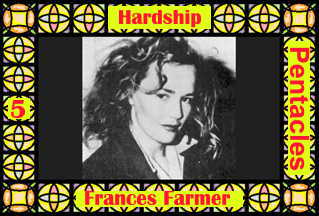
Click here for a choice of spreads: one-card, three-card, Celtic Cross
iFate.com
I love these guys… Click here for an I Ching reading that’s actually comprehensible (Love I Ching a little further down the page.) Click here for a selection of groovy tarot readings.
New Age Store
This is the best online reading site I’ve found. Deep and inspiring card interpretations on many topics. You can do “express” readings for some spreads (in which the cards are chosen for you without your having to shuffle), and choose either “deep” or “highlights” readings of each spread. Click here for the home page, then click on Tarot. The other readings are fun, too. Cartomancy is a little like what Mrs. Vanderhoff used to do. The readings are positive, thought-provoking, and very insightful.
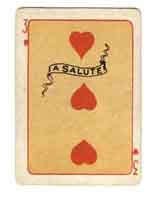
I wish you all a magnificent year, dear ‘Ratis, with love and friendship and happiness for us all…

